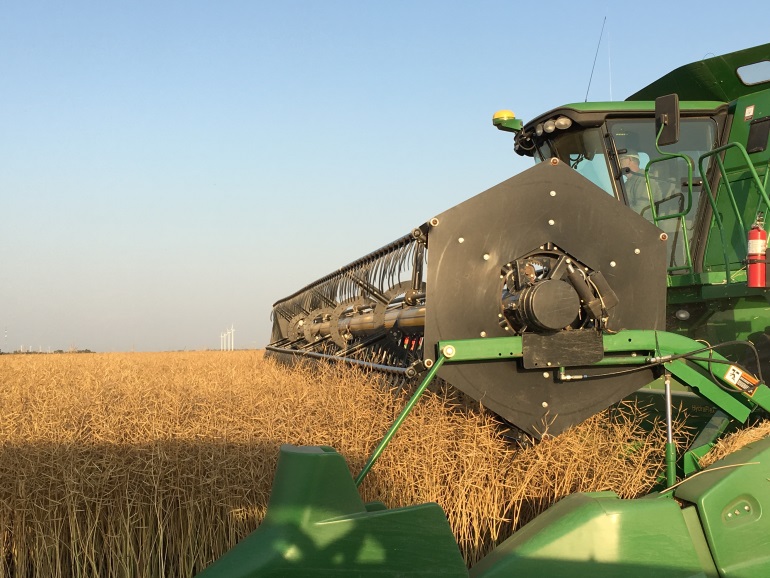The issue of trade and tariffs is on the mind of everyone involved in agriculture.
President of the Canadian Federation of Agriculture (CFA), Keith Currie says there was a lot of uneasiness - especially in the agriculture sector - back in January when President Trump first started talking about tariffs, but then we didn't know exactly what that would involve.
"We know that for the most part, any products that are CUSMA compliant aren't subject to tariffs or minimal tariffs. So the impact hasn't been huge, but of course there are our products the steel in particular that are subject to tariffs that's going to create slowdowns in production because of increasing costs. The increased costs associated with some of these products are going to hit the farm community pretty hard when you look at not only new equipment that farmers may want to purchase, but also parts. Things like nuts and bolts and barbed wire and stuff like that may not be exempt from the tariffs are going to have increased costs and therefore it's going to affect the bottom line of our farmers and ranchers across the country."
Currie says it was important to see the Canadian government drop the reciprocal tariffs as that means we won't see any additional costs to farmers and ranchers as a result on products that may have been subject to those tariffs. The CFA will continue to have conversations with the government to make sure that the impact from any tariff or CUSMA negotiations is as minimal as possible for the agriculture industry.
"Some of the frustration is we often get overlooked. In early days, Prime Minister Carney announced a package for the automobile sector, in the last month or so there was compensation announced for the forestry sector. Of course, I don't mean to suggest that those sectors aren't important, but when you combine them with oil and gas, aluminum and steel, they still don't match the output of agriculture in this country. We don't want to get compensation. We want to make sure that the deal is right, so we don't have to worry about government giving compensation. But if the deal is not right and there's an impact, we need to make sure that the government is looking at ways to continue to have agriculture grow and thrive and not be negatively impacting our members across this country."
There's a lot of discussion on how the Chinese tariffs are impacting the canola industry, but there's also a lot of concern over their tariffs on peas. China imposed a 100 per cent tariff on Canadian peas on March 20, 2025 as part of their response to Canadian tariffs. Starting on October 1, 2024, Canada implemented a 100 per cent tariff on Chinese electric vehicles (EVs), and a 25 per cent tariff on Chinese steel and aluminum imports on October 15, 2024.
Many in the agriculture sector believe the new tariffs we've seen from China are in relation to Canada's move.
Currie points out that agriculture is the largest manufacturing sector in the country by far, we are the largest employer by far. So let's make sure that we don't forget about agriculture in all of this and that also includes the impact that the tariffs are having with China on our canola, peas and some other products.
"Just for reference the canola industry GDP is larger than the automobile sector by itself. So, the government needs to act swiftly. I know that it's a fine line between dealing with the U.S. and not ticking them off, and how you're trying to deal with China in the tariff situation - particularly when it comes to the electric vehicles that we're tariffing. So it's, tricky, I know, but we have got to make sure. That our farmers aren't going to lose money and are not going bankrupt over these tariffs."
With that in mind and the fact that Parliament is set to resume in a few weeks, the agriculture sector signed an open letter to Prime Minister Carney - Let's Grow Canada: Staking a Claim for Agriculture in the Government Mandate - focusing on the importance of the agriculture sector to the country and it's GDP.
"The letter is urging the government to make agriculture a national priority. So that we can bolster the governments goal - which is one of economic growth and also still accomplishing some national food security priorities, as well as domestic food security. Our industry over the last decade is averaging a growth of $4 billion in annual GDP, and that's an incredible number. So what we're saying is with the right type of investment in domestic production, whether that's program dollars, whether that's increasing our value added processing because a lot of our products, the value in them is in the value added,.
Curries says that may mean modernizing the regulatory framework so that agriculture is more prosperous . It's really taking a look at the agriculture industry and the agri-food industry as a whole and putting a priority on that going forward.
